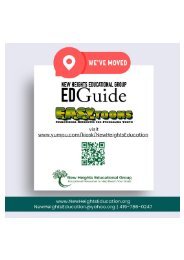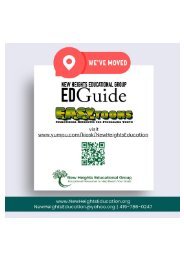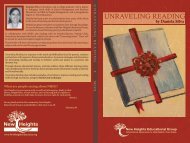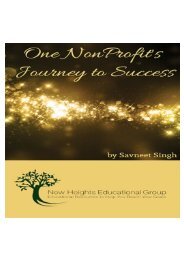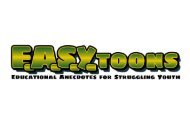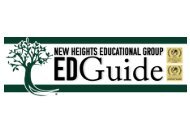NHEG EDGuide January 2017
A comprehensive guide to current educational topics, stories and news, along with highlights of the accomplishments, activities and achievements of the New Heights Educational Group. www.NewHeightsEducation.org
A comprehensive guide to current educational topics, stories and news, along with highlights of the accomplishments, activities and achievements of the New Heights Educational Group.
www.NewHeightsEducation.org
Create successful ePaper yourself
Turn your PDF publications into a flip-book with our unique Google optimized e-Paper software.
1
Pamela Clark<br />
Page 08<br />
Trump's Billionaire Education Secretary<br />
Has Been Trying to Gut Public Schools for<br />
Years<br />
Page 24<br />
It’s a Great Time to Be a Homeschooler<br />
Page 33<br />
Kids Who Might Need Extra Help<br />
Page 53<br />
Developing the Character of a Nation’s<br />
Citizens<br />
<strong>NHEG</strong> PAGES<br />
Founder/ Executive Director of<br />
The New Heights Educational Group<br />
Resource and Literacy Center<br />
COVER:<br />
The trees and the ground are<br />
covered in fresh white snow. I can<br />
go out side and build a snowman<br />
or snowwoman.<br />
Chief Execuve & Project Director<br />
Pamela Clark<br />
Editor<br />
Bill Naugle<br />
Cover Designer<br />
Marina Klimi<br />
Proof Reader<br />
Jenni Schreiber<br />
2
Just<br />
Conversations with Curt<br />
New Heights Educational Group 10th<br />
Anniversary Celebration with Pamela Clark<br />
3
4
<strong>January</strong> <strong>2017</strong><br />
Thank you to all the wonderful volunteers that are<br />
serving the <strong>NHEG</strong>. You are not only helping improve<br />
education, but you are helping make my dreams come<br />
true. I'm very passionate about education and making<br />
sure any families that need assistance receive it. Together<br />
we are making a difference. Let's continue to work<br />
together to undraw the lines others have drawn in<br />
education. We will make it fair and equal for<br />
everyone that is willing to work for it.<br />
Pamela Clark<br />
5
Ever Dream of having your own Radio Show ?<br />
New Heights Educational Group is a Resource and Literacy Center based in Defiance,<br />
Ohio. We share a concern with families having access to information for those<br />
with special needs, including Autism.<br />
We offer live internet radio shows to discuss various educational topics and we are<br />
looking for a VOLUNTEER to host a half-hour radio show. We would give the<br />
necessary training and the volunteer can choose the time of the show<br />
on Tuesday, Wednesday, or Saturday. Anyone interested in applying<br />
please email us at NewHeightsEducation@yahoo.com or call 419-786-<br />
0247 for more info. You can learn more about us by visiting our website<br />
www.NewHeightsEducation.org<br />
Please support our library and<br />
satellite office at:<br />
gofundme.com/9z4paprw<br />
6
Exciting news: our new book titled,<br />
"Unraveling Reading"<br />
On Sale Now at amazon and kindle!!!<br />
7
Trump's Billionaire Education Secretary Has Been<br />
Trying to Gut Public Schools for Years<br />
Meet Betsy DeVos, the anti-union, pro-voucher surprise nominee.<br />
K R I S T I N A R I Z G A<br />
Last Wednesday, President-elect Donald Trump announced that he would nominate billionaire<br />
activist and Republican fundraiser Betsy DeVos as his education secretary. The news came as a shock<br />
to the education world—DeVos' ideas for school reforms are even more radical than what Trump<br />
proposed on the campaign trail.<br />
Trump's signature education proposal calls for dedicating $20 billion in federal money to promote<br />
"school choice": market-driven education reforms that help families move away from what Trump has<br />
called "failing government schools" and instead choose private, religious, or charter schools. The<br />
movement for charter schools is bipartisan: Republicans and many centrist Democrats support it. But<br />
the DeVos family has been promoting a much more radical idea of choice—one that favors moving<br />
public funding to private and religious schools over charters.<br />
Education historian Diane Ravitch believes that—if confirmed by the Senate—DeVos will become the<br />
most radical, anti-public-school education secretary since the Office of Education was established in<br />
1867. "Never has anyone been appointed to lead in the past 150 years who was hostile to public<br />
education," Ravitch told Mother Jones.<br />
Here are the three most important things to know about Trump's education nominee:<br />
THE DEVOS FAMILY IS AMONG AMERICA'S MOST WEALTHY, CONSERVATIVE CLANS<br />
A daughter of privilege, DeVos is married to Richard (Dick) DeVos Jr., whose father, Richard Sr., cofounded<br />
the multilevel-marketing empire Amway and was Ahead of the 1980 elections, Ronald<br />
Reagan personally asked [Richard DeVos Sr.] to lead the GOP's national fundraising efforts. Short on<br />
cash and worth an estimated $5.1 billion. In 1992, Dick DeVos succeeded his father as the president<br />
and CEO of Amway and has been the face of the DeVos political dynasty. While the DeVoses aren't as<br />
well known as conservative philanthropists like the Koch brothers, they played a key role in building<br />
the modern conservative movement and pushing the Republican Party further to the right.<br />
Since 1970, the DeVoses have invested at least $200 million in various right-wing causes—think<br />
tanks, media outlets, political committees, and advocacy groups—as a 2014 Mother<br />
Jones investigation revealed. "There's not a Republican president or presidential candidate in the last<br />
50 years who hasn't known the DeVoses," Saul Anuzis, a former chairman of the Michigan Republican<br />
Party, told my former colleague Andy Kroll.<br />
As Kroll wrote in that 2014 piece:<br />
reeling from Jimmy Carter's election and the aftershocks of the Watergate scandal, the party needed all<br />
the help it could get. As the Republican National Committee's finance chairman, DeVos raised $46.5<br />
million ($132 million in today's dollars). At a party meeting in 1982, he called the recession that was<br />
spiking inflation and unemployment "beneficial" and "a cleansing tonic" for society.<br />
In the '80s and '90s, Betsy climbed the party ranks to become a Republican National<br />
Committeewoman, chair numerous US House and Senate campaigns in Michigan, lead statewide party<br />
Disclaimer: The views and opinions expressed in this article are those of the authors and do not<br />
necessarily reflect the official policy or position of The New Heights Education Group.<br />
Continued Next Page<br />
8
Trump's Billionaire Education Secretary Has Been<br />
Trying to Gut Public Schools for Years<br />
Meet Betsy DeVos, the anti-union, pro-voucher surprise nominee.<br />
K R I S T I N A R I Z G A<br />
Continued From Previous Page<br />
In 2003, she returned at the request of the Bush White House to<br />
dig the party out of $1.2 million in debt.<br />
As The New Yorker's Jane Mayer pointed out, the selection of DeVos as education secretary flies in<br />
the face of Trump's campaign promises to get rid of the Washington "donor class" that he's argued is<br />
rigging the American system.<br />
And here's a look at the DeVos family's giving tree:<br />
Disclaimer: The views and opinions expressed in this article are those of the authors and do not necessarily reflect the official<br />
policy or position of The New Heights Education Group.<br />
Continued Next Page<br />
9
Trump's Billionaire Education Secretary Has Been<br />
Trying to Gut Public Schools for Years<br />
Meet Betsy DeVos, the anti-union, pro-voucher surprise nominee.<br />
K R I S T I N A R I Z G A<br />
THE DEVOSES CREATED A ROAD MAP FOR<br />
CONSERVATIVES ON HOW TO BRING DOWN LABOR, INCLUDING TEACHERS UNIONS<br />
In 2007, coming off Dick's unsuccessful gubernatorial bid in their home state of Michigan, the<br />
DeVoses focused their advocacy and philanthropy on controversial legislation known as "right to<br />
work." These laws outlaw contracts that require all employees in unionized workplaces to pay dues for<br />
union representation. Back in 2007, such a proposal in a union-heavy state of Michigan was considered<br />
a "right-wing fantasy," but thanks to the DeVoses' aggressive strategy and funding, the bill became law<br />
by 2012.<br />
Right-to-work laws, now on the books in 26 states, have been a major blow to the labor movement—<br />
including teachers unions. Teachers in Michigan are no longer allowed to strike; when educators in<br />
Detroit protested earlier this year against growing class sizes, pay cuts, mold, roaches, and rodents in<br />
their classrooms, they had to use their sick days to make their point. (A month after the strike, Betsy<br />
DeVos wrote an op-ed in the Detroit News arguing that teachers shouldn't be allowed to stage sick-outs<br />
either.)<br />
Given her track record, there is very good reason to believe that DeVos would push to further erode the<br />
power of the teachers unions as education secretary. Randi Weingarten, the president of the American<br />
Federation of Teachers—the nation's second-largest teachers union—called DeVos "the most<br />
ideological, anti-public education nominee" in the past four decades.<br />
FOR DECADES, DEVOS PUSHED TO GUT PUBLIC SCHOOLS<br />
Continued From Previous Page<br />
Michigan serves as one of the most prominent examples of what aggressive DeVos-style school choice<br />
policies look like on the ground, especially when it comes to the expansion of charter schools. About<br />
80 percent of state charter schools are run by for-profit management companies, a much higher share<br />
than anywhere else in the country, and with very little oversight from the state. And this year, the<br />
DeVoses were the biggest financial backers of the effort to oppose any new state oversight of charters.<br />
Detroit, in particular, provides a cautionary tale of how the proliferation of charter schools without<br />
sufficient regulations hurts student achievement. Detroit's public school test scores in math and reading<br />
on the National Assessment of Educational Progress have remained the worst among large cities since<br />
2009. In June, the New York Times published a scathing investigation of the city's school district,<br />
which has the second-biggest share of students in charters in America. (New Orleans is No. 1.)<br />
Reporter Kate Zernike concluded that insufficiently regulated growth—including too many agencies<br />
that are allowed to open new charter schools—contributed to a system with "lots of choice, with no<br />
good choice":<br />
Disclaimer: The views and opinions expressed in this article are those of the authors and do not necessarily reflect the official<br />
policy or position of The New Heights Education Group.<br />
Continued Next Page<br />
10
Trump's Billionaire Education Secretary Has Been<br />
Trying to Gut Public Schools for Years<br />
Meet Betsy DeVos, the anti-union, pro-voucher surprise nominee.<br />
K R I S T I N A R I Z G A<br />
Continued From Previous Page<br />
The unchecked growth of charters has created a glut of schools<br />
competing for some of the nation's poorest students, enticing them to enroll with cash bonuses, laptops,<br />
raffle tickets for iPads and bicycles. Leaders of charter and traditional schools alike say they are being<br />
cannibalized, fighting so hard over students and the limited public dollars that follow them that no one<br />
thrives. Michigan leapt at the promise of charter schools 23 years ago, betting big that choice and<br />
competition would improve public schools. It got competition, and chaos.<br />
Perhaps even more than her push for charter schools, Betsy DeVos is known as a fierce advocate for<br />
the expansion of vouchers. Until about 2000, using public funding to pay for private and religious<br />
schools was a fringe idea, but the DeVos family worked diligently to push it to the center of the<br />
Republican Party. Today, 13 states have active voucher programs, in addition to the District of<br />
Columbia. DeVos serves on the board of the American Federation for Children, a national group that<br />
has pushed for school vouchers even as their record for improving student achievement is mixed, at<br />
best. As Douglas Harris, an economist at Tulane University and director of the Education Research<br />
Alliance for New Orleans, wrote in a New York Times op-ed, "Students who participated in<br />
[Louisiana's] voucher program had declines in<br />
achievement tests scores of eight to 16<br />
percentile points. In Ohio, the results were also<br />
negative (though less so)."<br />
If Trump's voucher agenda moves forward, it<br />
is also possible that the federal government<br />
could send some Title 1 funding, a $15 billion<br />
program that exclusively funds low-income<br />
public schools, to high-income private and<br />
religious schools. If that becomes policy,<br />
DeVos—a billionaire who never sent her<br />
children to public schools—could oversee the<br />
erosion of one of the most important federal<br />
school programs created to serve America's<br />
most vulnerable kids.<br />
President-elect Donald Trump and Betsy DeVos in<br />
Bedminster, New Jersey, on November 19 Andy Katz/<br />
AP<br />
Disclaimer: The views and opinions expressed in this article are those of the authors and do not necessarily reflect the official<br />
policy or position of The New Heights Education Group.<br />
11
With DeVos pick, school choice is likely Trump education<br />
President-elect Donald Trump has named Betsy DeVos as his choice for education<br />
secretary. DeVos, who has never worked in public education, is a prominent advocate<br />
of charter schools and school vouchers. What does this pick say about Donald Trump’s<br />
education agenda? John Yang discusses the appointment with Education Week’s Alyson<br />
Klein.<br />
Disclaimer: The views and opinions expressed in this article are those of the authors and do not necessarily reflect the official<br />
policy or position of The New Heights Education Group.<br />
12
Chad Stewart, former Disney animator and veteran home school dad, has been working in<br />
the feature animation world for 26 years. He began his career as an old fashioned handdrawing<br />
animator (flipping pages) and made the switch to digital/computer animation<br />
about 15 years ago. He is now an expert in both types of animation, which allows him to<br />
teach students about both aspects. This business has been a whole family venture<br />
involving not only Chad, but also his wife, Kayla and their children, who work to support<br />
and grow this company. Students from all over the United States and around the world<br />
are learning how to animate and draw through interactive, patient teaching and weekly<br />
feedback on their creations. Whether you are interested in a career in animation some day<br />
or just want to explore this animation art form, come join us for classes – we’d love to<br />
have you! Next session begins <strong>January</strong> 30th!<br />
13
Topics covered through the class:<br />
• The Principles of Animation<br />
• Hand Drawn animation<br />
• Computer Generated animation<br />
• Individual critiques of student work<br />
• Animation History<br />
Topics covered through the course:<br />
• Perspective<br />
• How to "See"<br />
• Texture<br />
• Line and Shape<br />
• Design<br />
• Light and Shadow<br />
• Silhouette<br />
Topics covered through the course:<br />
• Weight and Balance<br />
• Basic human structure<br />
• Body language<br />
• Examining human walks and runs<br />
• Acng and Expression<br />
• Communicaon and the Face<br />
• Joint criques of student work<br />
• and much more<br />
Topics covered through the course:<br />
• Character Expression<br />
• Shape and design<br />
• Personality<br />
• Gesture and moon<br />
• Structure: Skeletal and Muscular<br />
• Silhouee value<br />
• Creang a Character<br />
• and much more<br />
In the Animation Course Levels 1 & 2 the students are introduced to<br />
the concept of animation and physics, and applying that to animated<br />
motion and body mechanics. We learn how to do this through The<br />
Principles of Animation, ideas and concepts that were identified and<br />
written down by 2 of the original Disney Animators. Each week we<br />
will examine and explain one principle and then put it into practice<br />
as the student will have an assignment to create their own animation<br />
during the week (3-5 hours per week). Level 1 is required before Level<br />
2. Cost is $300 for the 12 week session.<br />
The Drawing Courses are aimed at introducing the different<br />
principles and techniques of drawing as an art form. The student<br />
will be introduced to the classic concepts of traditional drawing and<br />
how to use them to bring more life-like images to the page. These<br />
classes can be taken in any order.<br />
14
DATELINE: The Ohio Department of Education<br />
The Ohio Department of Education is announcing that students with<br />
disabilities who take the Alternate Assessment for Students with<br />
Signiicant Cognitive Disabilities (AASCD), instead of the general Ohio<br />
State Tests, are exempt from the requirement that all 11th grade students<br />
participate in the ACT/SAT. This does not, however, prohibit a student<br />
with a signiicant cognitive disability from taking the ACT or SAT if the<br />
student and/or parent requests to participate in the test.<br />
The Ohio General Assembly passed Senate Bill 3 on Dec. 8, 2016, which<br />
provides for additional exemptions and requires the Department to<br />
provide guidance on test participation for certain student populations.<br />
(ORC 3301.0712). The Department will release additional guidance in the<br />
coming weeks.<br />
15
Completing and submitting a Free Application for Federal Student Aid (FAFSA) is the single most<br />
important action you can take to get money for college.<br />
The FAFSA is used by schools to put together your financial aid package, including grants, work-study, federal student<br />
loans, and even state and school financial aid.<br />
If you’re applying for financial aid for academic year <strong>2017</strong>–18, you can now submit your FAFSA starting October<br />
1, 2016, using your 2015 income tax return.<br />
Be sure to submit the FAFSA every year you’re in college.<br />
Aid is awarded on a first-come, first-served basis, so know your deadlines and apply as early as you can to maximize<br />
your financial aid.<br />
For the most current information on this and other changes, be sure to visit studentaid.ed.gov.<br />
How to complete the FAFSA<br />
These three simple steps can make the process faster and easier.<br />
Step 1: Gather all the information you’ll need, including:<br />
· Your drivers’ license and Social Security number Your parents’ Social Security numbers and birthdates<br />
· Your family’s latest federal income tax returns W-2 forms<br />
· Bank statements Information on your family’s investments<br />
Step 2: Bookmark FAFSA.gov<br />
· Don’t fall for scams. The only site you should use to fill out and submit your application is FAFSA.gov.<br />
· There’s no charge for submitting the FAFSA.<br />
· This is where you get your Federal Student Aid (FSA) ID; the user name and password give you access to the site.<br />
· The site also has the most up-to-date information on upcoming changes.<br />
Step 3: Submit your FAFSA<br />
· The easiest and fastest way is to file online with your FSA ID. Your application will be processed within 3-5 days.<br />
· You can mail in a paper application, but the processing time will take about 7-10 days.<br />
13<br />
16
<strong>NHEG</strong>’s Volunteer of the Month program recognizes the dedication and<br />
work of some of our most active volunteers. <strong>NHEG</strong> relies on volunteers to<br />
help with our education programs, our special events, public outreach,<br />
and other activities that help fulfill our mission of supporting literacy for<br />
children and adults by offering a range of educational support services.<br />
Contact us to learn more about volunteering.<br />
This month we recognize a special group of volunteers: those that have<br />
gone above and beyond what is needed in their everyday duties. <strong>NHEG</strong> is<br />
an all-volunteer organization. We have volunteers from all around the<br />
world!<br />
Aditi Chopra<br />
Antonn Bryant<br />
Jeff Ermoian<br />
Divya Rani<br />
Bassey Arikpo<br />
Bill Naugle<br />
Briana Dincher<br />
Chelsea Tadesse<br />
Daniela Silva<br />
Enjoli Baker<br />
Frani Wyner<br />
Jenni Schreiber<br />
Julia Doyle<br />
Jyoti Dave<br />
Jyoti Dave<br />
Kiyoko Green<br />
Luyang Du<br />
Maggie Spangler<br />
Mike Anderson<br />
Nisha Zachariah<br />
Sheila Wright<br />
Pam Unruh<br />
Priscilena Shearon<br />
Ranita Ashlock<br />
Roberta Perkins<br />
Sam Custer<br />
Sathiyan Sivakumaran<br />
Savleen Grewal<br />
Shannon Williamson<br />
Tanushree Tiwari<br />
Katie Gerken<br />
Vanh Vue<br />
Victoria Lowery<br />
17
1929 — 1968<br />
Dear Fellow Homeschooler,<br />
Greetings! My name is Sheri Lang, and I homeschooled my three children<br />
from kindergarten through twelfth grade. During that time we were<br />
fortunate to have access to a local artist who gave art lessons to children and<br />
adults. One daughter recently graduated from college with double majors in<br />
art and theology. Another daughter is currently studying biology with an art<br />
minor. Although not studying art at this time, my son also benefited from<br />
the art lessons.<br />
Unfortunately many families do not have access to such art lessons nearby,<br />
or they may find the lessons to be too expensive to provide for all of their<br />
children. With these needs in mind, my daughters have created an online art<br />
education program which teaches children and adults at a beginner or<br />
intermediate level.<br />
This program consists of wholesome, step by step instructional videos. The<br />
content is sequential, each lesson building upon previous lessons. It teaches<br />
all the necessary foundations of drawing to help bring your budding artists to<br />
a more advanced level. Advanced classes will specialize in drawing people<br />
and horses. Once they have completed the drawing course, they will have<br />
access to watercolor painting, stained glass, and other more specialized<br />
courses. The cost is $19 per month for the whole family, which is often less<br />
expensive than a single class for one person.<br />
Check <strong>NHEG</strong> http://w ww.NewHeightsEducation.org/courses-and-classes<br />
page frequently for updates about this great new class.<br />
18
Dial 347-934-0450 for Priscilena Shearon<br />
19
Evangelical Christian Credit Union<br />
Join ECCU and we'll pay for up to two years of<br />
your HSLDA membership.*<br />
Simply open a checking account with direct deposit, savings account with a<br />
$500 balance and/or credit card to get started.* 1 account = 1 year<br />
CHECKING<br />
Easy to manage checking<br />
accounts with online and<br />
mobile banking, bill pay,<br />
mobile deposits, and a<br />
naonwide branch & ATM<br />
network.<br />
SAVINGS<br />
Higher savings rates than<br />
naonal average plus free<br />
online banking & mobile<br />
app, free electronic<br />
transfers, and naonwide<br />
branch & ATM access.<br />
CREDIT CARD<br />
With the Visa Gold<br />
Everyday Cashback Credit<br />
Card earn 1.5% cash back<br />
on every purchase, no<br />
annual fee, no<br />
internaonal transacon<br />
membership. 2+ accounts<br />
IN PARTNERSHIP WITH<br />
ECCU supports and celebrates the vibrant community of parents who have<br />
chosen to be their child’s primary educator. That’s why Home School Legal<br />
Defense Association (HSLDA) and ECCU are partnering and inviting you<br />
to join ECCU. Joining the ECCU family is easy and immediately<br />
rewarding because you can receive up to 2 years of HSLDA membership for<br />
free.*<br />
17<br />
20
Public Service Bulletin Board<br />
Up Coming Holidays<br />
<strong>January</strong> 1 New Years Day<br />
<strong>January</strong> 16 Martin Luther King<br />
<strong>January</strong> 20 Inaguration day<br />
2521
UNITED STATES HOME SCHOOL FAMILY-TO-FAMILY<br />
PROGRAM<br />
From <strong>NHEG</strong> Director Pamela Clark:<br />
“As a homeschool parent myself, I know the frustraons that come from wanng to provide your children a rich and versale<br />
educaon on a single income. Therefore, I’m pleased to announce New Heights Home School Family-to-Family Program, an<br />
effort that allows budget-conscious homeschool families the opportunity to travel for hands-on learning and work programs.”<br />
For many of us, a hotel is simply too expensive. “This collaboraon between homeschool families gives you and your children a<br />
place to stay as they expand their horizons and allows you to host other wonderful families, providing unique experiences and<br />
stories to share.<br />
We currently have 10 host families located in:<br />
Defiance, Ohio<br />
Modesto, California<br />
Northern California<br />
Bozeman, Montana<br />
Fairplay, Maryland<br />
Copper Canyon, Texas<br />
Conneccut<br />
Pembroke, Virginia<br />
Peterstown, West Virginia<br />
More to come…<br />
Interested? Please read our rules to see if the program fits your family. If so, please contact us to sign up.<br />
Basic Procedures & Requirements<br />
Vising families that parcipate in the program are also asked to be a host family; however, we realize this is not feasible for<br />
everyone. Rest assured, no one will be excluded!<br />
Host family:<br />
In order to ensure a good fit, you can choose to talk to the families/meet in a public place before taking them to your home.<br />
Provide safe, clean, cost-free place for family to stay.<br />
Provide references (so that all families feel secure).<br />
Please state whether you will offer meals during a student/family visit.<br />
Please state if you would like to be a guide to a vising family.<br />
Vising family:<br />
NO LIMITS,<br />
JUST GOALS!<br />
Please indicate if your children have special needs. This will allow your host family to provide you with needed special<br />
accommodaons.<br />
It is essenal that children respect other people, their homes and belongings. Please do not parcipate if your children have not<br />
yet learned this valuable skill.<br />
22
Do you have an empty building?<br />
We are a 501(c)(3) nonprofit organization seeking usable space or funding to operate a curricula library and<br />
administrative office.<br />
The New Heights Educational Group, Inc. promotes literacy for children and adults by offering a range of<br />
educational support services. Such services include: assisting families in the selection of schools; organization<br />
of educational activities; and acquisition of materials.<br />
We promote a healthy learning environment and enrichment programs for families of preschool and schoolage<br />
children, including children with special needs.<br />
It’s so important that we find a space for our library. Some of you may think that since we have a local public<br />
library that is enough. I do love public libraries and have spent hours utilizing their resources.<br />
So how is our library different? Our library contains curriculum for all ages of students. Anyone can come in<br />
and for a small fee take out curriculum for a week, month, or a year and its interchangeable. If you don’t like<br />
the curriculum you use simply bring it back and exchange for something else. We have books for every grade<br />
including college and resources for teachers/tutors. Our library serves all families but with special<br />
consideration for home and charter school families that need help on a small budget. We also have a private<br />
library that serves those being tutored. This is of great urgency; we have already turned away families this<br />
year that need these books.<br />
If you have a space in a commercial/industrial/business area or a residential property in Defiance County<br />
that you can donate to our organization, in return for a tax deductible certificate stating the value of the<br />
space, please contact us via our website www.NewHeightsEducation.org or email us<br />
at NewHeightsEducation@yahoo.com. We would love to discuss how you or your business will benefit from<br />
the donation program.<br />
Pamela Clark<br />
Executive Director<br />
419-786-0247<br />
Please contact us at 419-786-0247 or email us NewHeightsEducaon@yahoo.com<br />
or visit our website at www.NewHeightsEducaon.org<br />
This is a great way you can serve the<br />
community and this would be tax<br />
deducble.<br />
23
It’s a Great<br />
tIme to Be a<br />
HomescHooler<br />
Eric Smitherm<br />
Homeschoolers are a diverse bunch. Our teaching approaches and learning philosophies vary. Our<br />
politics run the gamut and our visions of education reform differ greatly. Yet, despite these contrasts,<br />
homeschoolers are remarkably similar. I recently asked a large, eclectic group of homeschooling<br />
parents why they chose this education option for their children. Key homeschooling features like<br />
"freedom," and "time," and "flexibility," and "individualization" were common drivers for all.<br />
Of course my first question was: "What about socialization?"<br />
When I first heard about homeschooling, it was 1998. I was a senior in college writing a research<br />
paper on education choice and the rising homeschooling movement, and became fascinated by this<br />
option. A college classmate of mine connected me with her family members who were<br />
homeschooling, and they invited me into their home to observe and ask questions. Of course my first<br />
question was: "What about socialization?"<br />
I remember the mom's calm and eloquent response, pointing out the obvious difference between<br />
being social and being socialized. She described their vibrant and engaging homeschooling networks,<br />
community involvement, and neighborhood activism. She explained that much of the socialization<br />
that happens in schools is not positive and can lead to malevolent behaviors, like cliques, and<br />
bullying, and unhealthy competition. Her homeschooled daughter graciously played her violin during<br />
my visit, and was one of the most curious, articulate, and polite young children I had ever met. I was<br />
hooked.<br />
Later, I went on to graduate school in education policy at Harvard and became more committed to the<br />
ideas of education choice and innovation and alternatives to school. Now, as a homeschooling mom<br />
to four, never-been-schooled children, I combine policy and practice on a daily basis, watching the<br />
extraordinary ways in which my children learn without school.<br />
Continued Next Page<br />
24
It’s a Great<br />
tIme to Be a<br />
HomescHooler<br />
Eric Smitherm<br />
According to new data released this month by the U.S. Department of Education, the number of<br />
homeschooled children has doubled since 1999 to 1.8 million children in 2012, or 3.4 percent of the<br />
overall school-age population. (As a comparison, about 4.5 million children are enrolled in U.S. K-12<br />
private schools.) According to the DOE data, the geographic distribution of today's homeschooling<br />
population is evenly split, with about one-third each in rural, urban, and suburban areas. "Concern<br />
about schools' environments" remains a top driver for homeschooling families, with 9 in 10 survey<br />
respondents indicating it was an important reason in their decision to homeschool.<br />
Homeschooling networks are diverse, active, and far-reaching.<br />
A lot has changed for homeschooling and education choice since the late-90s. Homeschooling has<br />
become much more mainstream. There are numerous resources for homeschooling families, including<br />
community-based, self-directed learning centers scattered across the country. Education choice is in<br />
high demand and family empowerment grows. With President-elect Trump’s appointment of Betsy<br />
DeVos as Secretary of Education, the umbrella of education choice promises to widen for more<br />
families. As The New York Times reports: "Ms. DeVos will probably be a boon to the relatively small,<br />
growing population of families that home-school their children."<br />
While I still get asked that knee-jerk question about socialization that I so naïvely asked years ago, I<br />
find it happens less often. Many people know homeschoolers, and some have even considered the<br />
approach themselves. Homeschooling networks are diverse, active, and far-reaching, connecting<br />
homeschoolers to each other and their community's resources in myriad ways. Organizations and<br />
businesses, museums and libraries, nature centers and community colleges recognize homeschooling's<br />
popular rise and offer classes and resources to meet different needs and interests. Free, online learning<br />
resources like MIT’s OpenCourseWare, HarvardX, Khan Academy, Coursera, Duolingo, and many<br />
more allow for easy, on-demand access to a range of topics and subjects. Facilitating learning and<br />
pursuing knowledge has never been easier or more accessible.<br />
It's a great time to be a homeschooler!<br />
Continued From Previous Page<br />
25
We’re Looking<br />
(Are you the perfect candidate?)<br />
We are considering bringing an assessor(s) to work<br />
within our organization to provide online<br />
assessments through our website. Each year families<br />
could visit our site and set up an assessment time to<br />
have these completed virtually or meet in person,<br />
depending on the assessor. We would create an<br />
online profile for each assessor and share posters and<br />
flyers with the public. <strong>NHEG</strong> would receive 20% of<br />
each referral.<br />
If you are interested in partnering with the New<br />
Heights Educational Group, please share a resume,<br />
three references, an email addresses, and proof that<br />
you are a licensed/ certified teacher holding a valid<br />
Ohio teaching certificate (excluding the non-tax<br />
certificate issued under Ohio Revised Code<br />
3301.071). A brief biography with a picture would<br />
also be appreciated.<br />
We will choose from the list of responses.<br />
Happy winter solstice!<br />
· Leonard Cohen - "Winter Lady" (1967)<br />
· Yes - "South Side of the Sky" (1971)<br />
· Galaxie 500 - "Snowstorm" (1989)<br />
· Belle & Sebastian - "Fox in the Snow" (1996)<br />
· Modest Mouse - "The Cold Part" (2000)<br />
· Arcade Fire - "Neighborhood #1 (Tunnels)" (2004)<br />
· Fleet Foxes - "White Winter Hymnal" (2008)<br />
Top 7 songs about<br />
winter by Music<br />
Timers Fans<br />
26
Gluten-Free Fried Chicken<br />
1 quart buttermilk<br />
1 tablespoon paprika<br />
2 teaspoons garlic powder<br />
2 teaspoons onion powder<br />
Kosher salt and cracked black pepper<br />
560 grams all-purpose gluten-free<br />
flour mix<br />
1 tablespoon smoked paprika<br />
2 chicken breasts, each cut in half<br />
2 chicken thighs<br />
2 chicken legs<br />
2 chicken wings<br />
1/2 cup canola oil (or vegetable oil)<br />
Directions<br />
1.Preparing to cook: Heat the oven to 450<br />
degrees F. Lay down a piece of parchment<br />
paper on a baking sheet.<br />
2.Making the batter: Whisk together the<br />
buttermilk, paprika, garlic power, and onion<br />
powder. Add a pinch of salt and pepper and<br />
stir.<br />
3.Making the flour: Whisk together a pinch<br />
each of salt and pepper, flour mix, and smoked<br />
paprika.<br />
4.Dipping the chicken: Set a large cast-iron<br />
skillet on medium-high heat. As the pan is<br />
heating, line up the chicken, the bowl of batter,<br />
and the spiced flour. Pour the oil into the hot<br />
pan.<br />
5.Frying the chicken: When the oil has reached<br />
375 degrees F, dip a piece of chicken in the<br />
batter. Shake off any excess liquid. Dip the<br />
chicken in the flour and coat it entirely. Place<br />
the chicken in the hot oil. Repeat with all the<br />
pieces of chicken.<br />
(Don't overcrowd the pan. You can always do<br />
this in two batches.)<br />
6.Flip the chicken pieces when the bottoms are<br />
nicely browned. When both sides are browned,<br />
put the chicken pieces onto the prepared<br />
baking sheet.<br />
7.Finishing the chicken: When all the chicken<br />
has been browned and laid on the baking sheet,<br />
put the baking sheet in the oven. Cook the<br />
chicken until the legs have reached an<br />
internal temperature of 185 degrees F and<br />
the breasts measure 155 degrees F.<br />
26<br />
27
Turkey Casserole<br />
Ingredients<br />
· 1/2 pound sliced baby portobello mushrooms<br />
· 2 shallots, chopped<br />
· 2 teaspoons olive oil<br />
· 2 cups cubed peeled butternut squash<br />
· 1 cup chopped sweet red pepper<br />
· 1/2 cup sliced fennel bulb<br />
· 2 cups reduced-sodium chicken broth, divided<br />
· 1/3 cup all-purpose flour<br />
· 1/2 cup 2% milk<br />
· 3 cups cubed cooked turkey breast<br />
· 2 tablespoons sherry or additional reduced-sodium<br />
chicken broth<br />
· 1 teaspoon rubbed sage<br />
· 1/2 teaspoon salt<br />
· 1/2 teaspoon dried thyme<br />
· 1/4 teaspoon pepper<br />
· 10 sheets phyllo dough (14x9-inch size)<br />
Refrigerated butter-flavored spray<br />
TOTAL TIME: Prep: 1 hour Bake: 10 min.<br />
MAKES: 6 servings<br />
Directions<br />
1. In a large skillet, saute mushrooms and shallots in oil until tender. Add the squash, red pepper<br />
and fennel; saute 5 minutes longer. Add 1/4 cup broth. Cover and cook over medium-low heat<br />
until vegetables are tender, about 15 minutes.<br />
2. Sprinkle flour over vegetables; cook and stir for 1 minute. Gradually add milk and remaining<br />
broth. Bring to a boil; cook and stir for 1-2 minutes or until thickened. Stir in the turkey, sherry<br />
and seasonings; heat through. Transfer to a 2-qt. baking dish coated with cooking spray.<br />
3. Stack all 10 phyllo sheets. Roll up, starting with a long side; cut into 1/2-in. strips. Place strips<br />
in a large bowl and toss to separate; spritz with butter-flavored spray. Arrange over turkey<br />
mixture; spritz again. Bake, uncovered, at 425° for 10 -15 minutes or until golden<br />
brown.Yield: 6 servings.<br />
28
Kids recipes: Sunny Side Up Tostada<br />
Servings 2<br />
· 1 package (10 3/8 ounces) of Lean<br />
Cuisine® Favorites Santa Fe-Style<br />
Rice & Beans<br />
· 2 Large eggs<br />
· 2 Whole wheat torllas<br />
· Hot sauce<br />
1. Featuring Lean Cuisine®<br />
Favorites Santa Fe-Style Rice &<br />
Beans<br />
2. Prepare rice & beans according<br />
to package direcons.<br />
3. Cook eggs sunny-side-up.<br />
4. Bake torllas on baking sheet at<br />
400° F for a few minutes on<br />
each side unl crispy.<br />
5. Spoon rice & beans onto<br />
torllas.<br />
6. Top each with an egg and hot<br />
sauce.<br />
29
We have a huge collection of data regarding various disabilities and how to manage the<br />
education of your kids with various disabilities ranging from Autism and ADHD to<br />
Prader-Willi Syndrome. We have hands-on experience in dealing with kids from<br />
various backgrounds. If you have any questions or information to contribute,<br />
please contact us.<br />
Autism spectrum disorder<br />
ADHD<br />
ALS<br />
Bipolar disease<br />
Cancer<br />
Celiac disease<br />
Cerebral palsy<br />
COPD<br />
Cystic fibrosis<br />
Down syndrome<br />
Driver education<br />
Dyslexia<br />
Disabled persons<br />
Fragile X syndrome<br />
Hearing loss<br />
Irlen syndrome<br />
Neural tube defect<br />
Paralysis<br />
Phenylketonuria<br />
Prader-Willi syndrome<br />
Rett syndrome<br />
Sickle cell disease<br />
Spina bifida<br />
Spinal deformity<br />
Stroke<br />
Tay-Sachs disease<br />
30
31 31
Help us Reach Our Fund-raising Goals<br />
Please collect the following items and share with <strong>NHEG</strong> to help us reach<br />
our fundraising goals.<br />
TerraCycle<br />
Outsmart Waste<br />
Cell Phone Brigade® E-Waste Brigade® Inkjet Brigade® Laptop Brigade®<br />
DONATE YOUR OLD CAR, BOAT OR RV Make a Car Donation | Make a Difference<br />
Call 1-800-240-0160 and a friendly car donation specialist will schedule your<br />
pick-up appointment.<br />
A public charity 501 (c) (3) non-profit organization<br />
32
Mary L. Gavin, MD<br />
Isn't every kid special? We think so. But what do we mean when we say "kids with special<br />
needs"? This means any kid who might need extra help because of a medical, emotional,<br />
or learning problem. These kids have special needs because they might need medicine,<br />
therapy, or extra help in school — stuff other kids don't typically need or only need once<br />
in a while.<br />
Maybe you know of kids in your school who need a wheelchair or use braces when they<br />
walk. Those kids have special needs. They not only need the equipment that helps them<br />
get around, but they might need to have ramps or elevators available. They also might<br />
need to ride a special bus to school — one that lifts them up into the bus so they don't<br />
have to get up the steps.<br />
Kids who have illnesses, such as epilepsy or diabetes, would have special needs, too.<br />
They might need medicine or other help as they go about their day. Kids<br />
with sight problems might use special apps, tablets, or computers to read. Those<br />
with hearing or speech problems would have special needs, too. A kid who has hearing<br />
trouble might need hearing aids to hear and speech therapy, too, since it can be hard to<br />
say words correctly when you can't hear very well.<br />
Kids with learning problems often have special needs. Kids with Down syndrome might go<br />
to a regular school and might even be in your class. But they have special needs when it<br />
comes to learning, so an aide (someone to help) might come with them to class.<br />
You might be able to spot a few kids with special needs, but you probably don't notice all<br />
of them. A kid could have a problem that isn't noticeable unless you know the person<br />
well. For example, someone could have trouble with anxiety (worry), but you wouldn't<br />
know it unless the kid told you about it. Privately, their parents, teachers, and<br />
counselors may be working to help them worry less.<br />
What's Life Like for a Kid With Special Needs?<br />
Life can be extra-challenging for a kid with special needs. It might be harder to do<br />
everyday stuff — like learning to read or, if a person has physical handicaps, just getting<br />
around school or the mall. The good news is that parents, doctors, nurses, therapists,<br />
teachers, and others can help. The goal is to help kids be as independent as<br />
possible.Other kids also can be a big help. How? By being a friend. Kids who need a<br />
wheelchair or have other health problems want friends just like you do. But meeting<br />
people and making friends can be tough. Some kids might tease them or make fun of<br />
them. Be sure to tell a teacher if you see someone being bullied or teased. That's a very<br />
lonely feeling.<br />
Continued On Next Page<br />
33
Mary L. Gavin, MD<br />
Continued From Previous Page<br />
Also try to be helpful if you know someone with special needs. Ask if they<br />
would like help with carrying their books or opening a door. Ask them to join<br />
you and your friends at lunch. It's important not to be "overly helpful" when<br />
no help is needed. Why? Because just like you, kids with special needs like to<br />
be as independent as they can be.<br />
Being friendly to kids with special needs is one of the best ways to be helpful.<br />
As you get to know them, they may help you understand what it's like to be in<br />
their shoes. And you'll be helping fill a very special need, one that everybody<br />
has — the need for good friends.<br />
34
Charlotte McGuire<br />
CHARLOTTE McGuire<br />
35
Help homeschooling families<br />
harmed by fires and tornados<br />
The Home School Foundation (HSF), HSLDA's charitable arm, is reaching out to<br />
homeschooling families in Alabama, Georgia, North Carolina, and Tennessee who have lost<br />
school supplies, valuables and even homes in the recent tornados and wildfires. We need<br />
your help to best assist them!<br />
Earlier this year, when massive flooding affected thousands of families in Louisiana, we helped<br />
43 homeschooling families replace their destroyed curriculum and school materials. One<br />
family we helped shared just how significant this support was:<br />
We just wanted you to know how much your grant has meant to us. We have been waiting<br />
on FEMA since August to 'give' us money to rebuild our home with no recourse. As a result,<br />
we are paying for the rebuilding of our home out of our own pocket, so your grant to replace<br />
our schoolbooks was a huge blessing. We cannot thank you enough!<br />
—the Truesdell family<br />
This kind of help is possible because of caring, generous friends like you!<br />
Your gift enables us to help homeschooling families affected by these recent<br />
disasters.<br />
Thank you!<br />
36
ART RESOURCES<br />
SPECIAL NEEDS<br />
MATH RESOURCES<br />
READING RESOURCES<br />
MUSIC RESOURCES<br />
HISTORY RESOURCES<br />
<strong>NHEG</strong> website membership is only $25 per year. That comes to $2.09 per month. $2.09 a<br />
month will open the doors to many resources for the parent and student, either home<br />
schooled, charter schooled, or public schooled. We have built up a wonderful library of<br />
resources and have the ability to help students and families get the materials they need to<br />
succeed in their endeavors. One of our goals is to help remove as many roadblocks as<br />
possible to allow our students to show their capabilities.<br />
37
38
As a parent you work hard to provide a beer life for your child(ren). We work hard to<br />
make sure that you have the knowledge and resources you need to educate your<br />
child. This organizaon is the first of its kind. We are building gateways and resources<br />
to empower you and your child(ren) to achieve your goals and dreams. We believe that<br />
parents should be the caretakers of their children not a school or educaonal system.<br />
We work with the enre family unit and provide fill-in-the-gap type learning when<br />
reaching students. We have seen incredible advancements with students that<br />
parcipate in our program. Students being tutored normally jump 2 years in a 9-month<br />
period. The most we have seen is 3- and 4-year advancements with a science and math<br />
student that suffered from seizures when younger. This was accomplished in a lile<br />
over a year’s me. We have worked with students from all backgrounds and<br />
disabilies/special needs. If you really want to make a change and stop the cycle of bad<br />
grades, depression and students that are about to give up, we can help. We have<br />
helped many families and have seen amazing changes.<br />
NO LIMITS, JUST GOALS!<br />
WE BELIEVE, DO YOU?<br />
39
Colleges of Distinction's Diana Biffl just published a great new article on the CLT! Read it<br />
here: http://collegesofdistinction.com/resource/new-kind-college-entrance-exam/.<br />
40
<strong>NHEG</strong> has the opportunity to win some classroom supplies.<br />
Please vote for us!<br />
https://www.educents.com/wishlist/index/index/wishlist_id/26794/<br />
This is our referral link. http://www.educents.com/signup-bonus.html?r=270976<br />
We will receive $10.00 in Edubucks credit once someone uses this URL to create an account and<br />
make a purchase of $25 or more on our site.<br />
Help us save even more on educational products!<br />
41
<strong>NHEG</strong> Organizational Chart<br />
<strong>January</strong> 28, <strong>2017</strong><br />
42
Please Check It Out:<br />
The website link below has a drop down list. Customer can choose our name from the list for a<br />
portion of their purchase being donated to us.<br />
http://www.123contactform.com/form-1237983/Bonus-Bucks-Registration-Form<br />
You will find your organization listed under the drop down box.<br />
Missed a show? Check out past shows here:<br />
http://www.newheightseducation.org/education-talk-radio-nheg<br />
http://www.newheightseducation.org/kathy-woodring.html<br />
As they explore a new topic on education every week. . .<br />
43
1 New Year's Day<br />
2 Run up the Flagpole and See if Anyone<br />
Salutes Day<br />
3 Fruitcake Toss Day<br />
4 Trivia Day<br />
5 National Bird Day<br />
6 Cuddle Up Day<br />
7 Old Rock Day<br />
8 Bubble Bath Day<br />
8 Male Watcher's Day<br />
9 Play God Day<br />
10 Peculiar People Day<br />
11 Step in a Puddle and Splash Your Friend's<br />
12 National Pharmacist Day<br />
13 Make Your Dream Come True Day<br />
14 Dress Up Your Pet Day<br />
15 National Hat Day<br />
16 Martin Luther King Jr. Birthday<br />
17 Ditch New Years Resolutions Day<br />
18 Thesaurus Day<br />
19 National Popcorn Day<br />
20 Penguin Awareness Day<br />
21 National Hugging Day<br />
22 National Blonde Brownie Day<br />
23 National Pie Day<br />
24 Compliment Day<br />
25 Opposite Day<br />
26 Spouse's Day<br />
27 Chocolate Cake Day<br />
28 Chinese New Years<br />
29 National Puzzle Day<br />
30 National Inane Answering Message Day<br />
31 Inspire Your Heart with Art Day<br />
Month:<br />
National Bath Safety<br />
Month<br />
National Blood<br />
Donor Month<br />
National Braille<br />
Literacy Month<br />
National Hobby<br />
Month<br />
Hot Tea Month<br />
National Oatmeal<br />
Month<br />
National Soup Month<br />
Week Celebrations:<br />
2nd Week<br />
Letter Writing Week<br />
44
Reviews for<br />
‘Unraveling Reading’<br />
I learned a lot, and I was so glad that<br />
I read it. We often forget that the<br />
student’s whole body contributes to<br />
their learning, and the brain exercises<br />
are such simple things that can make a<br />
huge difference! I think it provides a<br />
lot of easy to follow strategies for a<br />
variety of readers and learners to<br />
follow without shying away from<br />
technical terms. Also, I like that it<br />
provides insight into the way students<br />
learn and think, and that it reminds the<br />
reader to encourage and be positive<br />
when teaching. It’s important to not<br />
only know strategies but the rationale<br />
behind them. I think the opportunity<br />
to link to videos demonstrating the<br />
strategies would enhance and take<br />
advantage of its e-book format. As a<br />
writing instructor, there are things that<br />
I could share with my adult students<br />
who may have struggled with reading<br />
in high school or have re-entered<br />
college after some time away and are<br />
struggling with college-level texts.<br />
I’m also much more aware of learning<br />
disabilities that students in my class<br />
are struggling with or may not even<br />
realize that they have. I’ve read a bit<br />
about the cognitive science approach<br />
to literature (why we read fiction, how<br />
fiction affects our brain); so many<br />
parts of this book were right up my<br />
alley.<br />
Sheila Wright<br />
Unraveling Reading:<br />
I grew up attending public school, where my classmates<br />
and I would sit through the same lessons, use the same<br />
books, and be educated in the same, cookie-cutter way.<br />
However, there was a select group of students who<br />
would be removed from our classroom each day after the<br />
pledge and morning announcements. These were the<br />
students who weren't built to be taught in a traditional<br />
classroom, and special contract teachers were brought in to<br />
work with them each day, one-on-one and in small groups,<br />
in a different location. They came to be known as the<br />
"Speech kids," and even though we saw them each<br />
morning, played with them on the playground, and even<br />
hung out with them playing sports after school in our small<br />
town, they were segregated from their peers throughout the<br />
school day when learning was taking place. It made me sad<br />
for them; I felt like they stood out, that other kids our age<br />
labeled them unfairly.<br />
Unraveling Reading made me realize that these "Speech<br />
kids" were more than likely just as smart as we were. They<br />
were being taught the same material we were, only in a way<br />
that suited them. I grew up believing that there was just one<br />
style of learning, and if you couldn't grasp that style, you<br />
were isolated from your friends and classmates as<br />
punishment. My hopes are that, by publishing Unraveling<br />
Reading, there will be less of that segregation, and more<br />
celebration of student uniqueness and individuality! Having<br />
a chance to read this book really made me aware that there<br />
are several types of learning styles, and even though I am<br />
not an educator by profession, I was still able to take away<br />
some tips for working with people regarding the different<br />
styles. I believe this could be useful when teaching a coworker<br />
a task, a friend, or even maybe when working with<br />
my own children with their life skills.<br />
Great job Daniela! You've definitely spread the word on the<br />
endless possibilities of education.<br />
Jenni Schreiber<br />
45
46
esoLutions<br />
How Are Yours Going? ? ?<br />
47
Are you sharing our newest monthly Magazine and would like to be<br />
added to our Magazine mailing list……….<br />
Drop us an Email to: Newsletter@NewHeightsEducation.org<br />
48
Book ad<br />
49
7th Annual <strong>2017</strong> PR World Awards<br />
Welcome and Introduction<br />
The annual PR World Awards® is a premier recognition program that culminates with a Red-Carpet Awards Gala each year. This award<br />
program consists of the following sections:<br />
· Public Relations Awards<br />
· PR Agency of the Year Awards<br />
· Marketing Awards<br />
· Corporate Communications Awards<br />
· Investor Relations Awards<br />
· Business Development Awards<br />
Organizations of any size and industry and PR agencies from all over the world can participate. Read the How To Submit tips first. This<br />
will help you plan your submissions.<br />
We have been entered into the contest! Keep your fingers crossed!<br />
50
<strong>January</strong> <strong>2017</strong> Crossword<br />
51
Developing the Character of a Nation’s Citizens<br />
By David Lantz<br />
There’s a lot of talk these days about what it means to be an American. The more diverse we become,<br />
the more difficulty it seems we have in answering this question. But whatever that answer might be, we<br />
should expect that, at its core, being an American means that we share some national sense of who we<br />
are – what moral virtues do we all aspire to, what ideals do we most cherish? The question is: “How do<br />
we instill in our citizens moral qualities and ideals our nation holds dear?”<br />
In the American experience, I believe this question is answered as follows:<br />
The moral character of Americans is shaped through what we believe, read and experience. These three<br />
things mold who we are and hold most dear.<br />
I’d like to spend the next few paragraphs unpacking this idea, and how we have attempted to determine<br />
what it is our citizens will read and experience in the formation of the American character and what we<br />
believe.<br />
George Washington’s Call for a Nation Built on Private Morality<br />
History records that when George Washington was sworn in as President of the United States, he was<br />
very aware of the precedent he was setting for the new nation of America. Scholars have found in<br />
his First Inaugural Addressan American application of Moses’s warning in Deuteronomy chapter 28,<br />
in which Moses laid out the blessings God would bestow on Israel if they followed his commands, and the<br />
curses that would befall them if they failed to do so. Washington said:<br />
No People can be bound to acknowledge and adore the invisible hand, which conducts the Affairs<br />
of men more than the People of the United States. …These reflections, arising out of the present<br />
crisis, have forced themselves too strongly on my mind to be suppressed. … Since we ought to be<br />
no less persuaded that the propitious smiles of Heaven, can never be expected on a nation that<br />
disregards the eternal rules of order and right, which Heaven itself has ordained: … I behold the<br />
surest pledges … that the foundations of our National policy will be laid in the pure and immutable<br />
principles of private morality; and the pre-eminence of a free Government, be exemplified by all<br />
the attributes which can win the affections of its Citizens, and command the respect of the world.<br />
How would the young country promote “private morality”? The founders saw the need to provide for a<br />
system of public education. In passing The Land Ordinance of 1785, they established a means for funding<br />
public education. Section 16 in each township was reserved for the maintenance of public schools. In<br />
1836, William McGuffey published what came to be called the McGuffey Eclectic Reader. It was the<br />
nation’s first common textbook, and sold over 120 million copies. John Westerhoff III, in his book<br />
“McGuffey and His Readers,” wrote :<br />
When we investigate the content of McGuffey’s Readers, three dominant images of God emerge.<br />
God is creator, preserver, and governor.<br />
Continued On Next Page<br />
52
Developing the Character of a Nation’s Citizens<br />
By David Lantz<br />
Continued From Previous Page<br />
For over a century, the public schools of the United States used the McGuffey Reader to instill the<br />
“private morality” Washington had called for during his first inaugural address. But beginning in the<br />
1920s, a movement arose to remove free market economics and Christianity from what was taught to our<br />
young people. In 1934, Willard E. Givens issued this statement in a report titled “Education for the New<br />
America” during the Proceedings of the 72nd Annual Meeting of the National Education Association:<br />
“A dying laissez-faire must be completely destroyed and all of us, including the owners, must be subjected<br />
to a large amount of social control. A large section of our discussion group, accepting the conclusions of<br />
distinguished students, maintain that in our fragile, interdependent society, the credit agencies, the basic<br />
industries, and utilities cannot be centrally planned and operated under private ownership.<br />
… Hence, they will join in creating a swift nationwide campaign of adult education which will support<br />
President Roosevelt in taking these over and operating them at full capacity as a unified national<br />
system in the interests of all of the people.”<br />
Another participant in this movement was Norman Woelfel, a PhD candidate who studied under Dr.<br />
George Counts (part of a national commission to redesign the teaching of social studies in the US) and<br />
Dr. John Dewey (creator of the Dewey Decimal system). In 1934, Woelfel published his doctoral<br />
dissertation in book form. His book, called “Molders of the American Mind,” was a review of 17<br />
prominent educators of that day. Near the end of his book, Woelfel concluded:<br />
The things of highest value for individual experience and for ethical standards in modern America will not,<br />
however, be found out so long as intellectual leaders maintain sensitivity over the supernatural<br />
significance of Christian mythology or a sentimental personal attachment to the character of<br />
Jesus. (Emphasis added. Woelfel, Norman.Molders of the American Mind: A Critical Review of the Social<br />
Attitudes of Seventeen Leaders in American Education. (Columbia University Press: New York),<br />
1934, pp. 205, 229.)<br />
Today, except in some home school and church school programs, the McGuffey Readers are no longer<br />
used. Space does not permit the tracking of how efforts by progressive educationalists led to the removal<br />
of Christianity’s influence in public education.<br />
Suffice it to say that by the middle of the 20th century, schools switched to readers like “Dick and<br />
Jane which no longer taught the Bible stories. Test scores began to drop, along with a moral<br />
decline of our youth and a rising crime rate.”<br />
As a result, in 2016, like the Israelites of old, America has witnessed the rise of a new generation that, in<br />
the words of Judges 2:10, “grew up who knew neither the LORD nor what he had done for Israel.”<br />
Continued On Next Page<br />
53
Developing the Character of a Nation’s Citizens<br />
By David Lantz<br />
Reviving Washington’s Call for Private Morality<br />
As a college freshman at Butler University in 1975, I took my one and only Bible course. It was a survey<br />
of the Old Testament. The instructor had us read “The Source” by James Michener. After reading that<br />
book, I fell in love with the idea of using historical fiction to bring the Bible alive for modern readers. As a<br />
young father, I looked for age appropriate books to read to my children. Books like The High King by<br />
Lloyd Alexander, A Wrinkle in Time by Madeleine L’Engle, and The Bronze Bow by Elizabeth<br />
Speare. And, I know I’m not the only person to have done so.<br />
It is this belief in the importance of literature as a means of character education that has led me on a<br />
twenty year journey to write my own novel and develop a comparative history curriculum intended to help<br />
the reader apply precepts of the Bible to a modern age. This two minute video introduces the idea<br />
behind Clash of the Superpowers, a curriculum built around the events of 600 BC, as I envisioned<br />
how Jeremiah, Daniel and Ezekiel would have set about the creation of a “brotherhood of the scroll” to<br />
preserve God’s word in a foreign land.<br />
Call A Nation to Prayer<br />
Continued From Previous Page<br />
Clash of the Superpowers is designed around my novel, Brotherhood of the Scroll. The prophet<br />
Daniel plays a prominent role in that novel. At one point in the later part of his ministry, Daniel sought<br />
God’s mercy on behalf of Jerusalem and the temple. In Daniel 9:8-11, we read:<br />
We and our kings, our princes and our ancestors are covered with shame, LORD, because we<br />
have sinned against you. The Lord our God is merciful and forgiving, even though we have<br />
rebelled against him, we have not obeyed the LORD our God or kept the laws he gave us through<br />
his servants the prophets. All Israel has transgressed your law and turned away, refusing to obey<br />
you. “Therefore the curses and sworn judgments written in the Law of Moses, the servant of God,<br />
have been poured out on us, because we have sinned against you.<br />
Daniel was mindful of the words Moses had written regarding the blessings and the curses in<br />
Deuteronomy 28. Likewise, George Washington was mindful of not only the words of Moses, but also<br />
Daniel’s prayer. Today, America faces anarchy in the streets. The word of God is the solution, but<br />
increasingly, secular society is seeking to silence the message of Christ. The solution to the moral crisis<br />
we face will not be found in any action of own. Instead, it must begin with prayer.<br />
Like the Prophet Daniel, George Washington, and now Franklin Graham, this is our time to humble<br />
ourselves, repent of our sins, and beseech the Lord to heal our land.<br />
Prayer<br />
The nurturing of private morality<br />
Christians using the tools of cultural expression such as books and movies to share the Gospel of Christ.<br />
All are needed, now, if we are to develop the character of our nation’s citizens.<br />
54
MISSING<br />
MISSING<br />
55
We received permission from Hillsdale College in Michigan<br />
to share their courses on our website. Each link offers a<br />
group of classes.<br />
Some of the non-credit courses being offered:<br />
Course Catalog<br />
· An Introducon to C.S. Lewis: Wrings and Significance<br />
· Winston Churchill and Statesmanship<br />
· The Federalist Papers<br />
· A Proper Understanding of K-12 Educaon: Theory and Pracce<br />
· The Presidency and the Constuon<br />
· Great Books 102: Renaissance to Modern<br />
· Constuon 101: The Meaning & History of the Constuon<br />
· Great Books 101: Ancient to Medieval<br />
· Economics 101: The Principles of Free Market Economics<br />
· History 102: American Heritage, From Colonial Selement to the Reagan Revoluon<br />
· History 101: Western Heritage, From the Book of Genesis to John Locke<br />
· Other Lectures and Programs<br />
· Hillsdale Dialogues: A Survey of Great Books, Great Men, and Great Ideas<br />
Kirby Center Lectures Archive<br />
Hillsdale College on YouTube<br />
56
The Only Radio Station you will ever NEED!<br />
<strong>NHEG</strong> RADIO<br />
<strong>NHEG</strong> Radio….Quality Radio….Informative Radio<br />
Hi Victoria,<br />
Great job this week! Your voice was loud enough and again I did not hear any<br />
back-ground noise. In my opinion, teen dating abuse needs to be<br />
discussed more often because dating generally starts during the<br />
teen years and they need to be more aware of what is<br />
acceptable and not acceptable.<br />
Sincerely,<br />
Shannon<br />
57
Be Part of History!<br />
58
Founded on December 29, 2012<br />
Products<br />
Handmade cards<br />
Company Overview<br />
Send us addresses of any child that may need a card.<br />
General Information<br />
Kindcards22@gmail.com for cards and to send a message or write us<br />
on here.<br />
Mission<br />
To promote hope!<br />
CONTACT INFO<br />
@KindCardsForSickKidsAndSoldiers<br />
kindcards22@gmail.com<br />
STORY<br />
59
December 17, 2016<br />
New Heights is an amazing place to<br />
volunteer and work. I've been volunteering<br />
for about 3-5 years now and I think that<br />
Pamela Clark does an amazing job at<br />
providing volunteers with meaningful and<br />
impactful work with room for personal growth. I love working here and I<br />
love working with all the individuals who share New Height's vision. I would<br />
definitely recommend it as a place for volunteers to find their own passions<br />
and enhance their skills.<br />
60
Bassey Arikpo<br />
11/19/16<br />
Video Editor/Designer<br />
Sun (Crystal) Xin ` Ranita Ashlock<br />
11/21/16 12/12/16<br />
Software/Prog. Develop Hr Coordinator<br />
Luyang Du<br />
11/27/16<br />
Program and Software Developer<br />
Help building Interactive Courses for students<br />
Help with the free version of Lifter LMS<br />
Bringing/Creating the services online that reaching more<br />
people<br />
Creating Apps<br />
Creating software for assessments/testing<br />
Antonn Bryant<br />
11/29/16<br />
Proofreader/Editor<br />
Jeff Ermoian<br />
12/1/16<br />
Graphic Artist/Photographer<br />
Design and Refine Logo art<br />
Website Support<br />
Divya Rani<br />
Frani Wyner<br />
12/5/16 12/10/16<br />
HR Coordinator<br />
Photographer<br />
Yanni Zack<br />
12/11/16<br />
Assistant Virtual Development Director<br />
Teaching and Education Department<br />
And assist with research<br />
61
By Corey Whelan<br />
You might assume the small children counting change at the grocery store register or hightailing it into<br />
the library at 12 p.m. on a Thursday are off from school for some unknown holiday or exotic teacher<br />
preparation ritual. Despite the preponderance of kids of all ages out there on the street, this may not be<br />
the case. The hoards of youngsters standing in line at museums and attending pottery classes , or<br />
accompanying their parents to yoga or jazz ballet during weekday hours, may actually be among the 1.5<br />
million children currently estimated as being homeschooled in the U.S.<br />
The U.S. Dept. of Education’s most recent statistics show a slow, yet steady climb in the number of<br />
children whose parents eschew both the public school system and expensive, private schools, opting to<br />
take matters into their own hands and educate their kids on their own.<br />
The reasons for this phenomena vary and may be linked to ideology or geographic region. While the<br />
ranks of homeschooling families were once comprised primarily of parents citing religious reasons for<br />
their choice, the familial demographics of those opting out of formalized education has become wildly<br />
diverse and currently includes every stereotypical parental prototype imaginable.<br />
Why homeschool?<br />
“I realized early on that my daughter was a fidgeter,” says one Vermont mother whose child was<br />
diagnosed with Attention Deficit Disorder (ADD), and who asked to remain anonymous. “I saw so much<br />
of myself in her at that age. My inability to sit still absolutely interfered with my desire to excel in school.<br />
Watching her struggle made me remember how frustrated I felt, having to sit, unmoving, in a classroom.<br />
In those days, ADD was only something you did with numbers and not a diagnosis. When my daughter<br />
started having the same types of issues, it occurred to me that her school environment was holding her<br />
back in the same way it held me back. Rather than take the school system on, I decided to homeschool<br />
my daughter so she could move around freely without feeling shame and learn at her own pace.<br />
Continued On Next Page<br />
62
By Corey Whelan<br />
Continued From Previous Page<br />
So far, so good. She excels at math and is able to comprehend challenging concepts as long as they are<br />
presented in small doses.” She is not alone in her frustration with how the educational system handles<br />
atypical learning styles or learning disabilities. A Dept. of Education survey cites 73 percent of<br />
homeschooling parents as being dissatisfied with the academic instruction available in local schools.<br />
Learning styles can be a significant factor in a parent’s decision to homeschool their child, but is not the<br />
only one. Kids, particularly those growing up in urban areas, may find the regular school schedule chafing<br />
up against their burgeoning interests in theater, dance or art. Some parents who opt to homeschool their<br />
children do so in an attempt to alleviate scheduling issues between traditional class time and time spent<br />
pursuing their children’s specialized talents. Advocates of homeschooling cite this as an admirable<br />
choice, but others argue that it is not in the best interests of the child.<br />
Why not homeschool?<br />
Teaching styles vary widely among parents who homeschool their kids. Some follow standard school<br />
curriculum, utilizing text books and following a schedule that includes math and English, while others opt<br />
to unschool, meaning that no curriculum whatsoever is utilized and each day is different from the next.<br />
Unschooling may be earmarked by a variety of trips and learning experiences and can be highly creative<br />
and child-led. But for some, these freewheeling unschooling days may instead be parent-led, pushing<br />
children to concentrate their efforts on interests of note for the adult rather than the child, or on religious<br />
ideology.<br />
Arguably, an asset of attending regular school is the opportunity it affords kids to be exposed to a wide<br />
variety of subjects, not just those currently of interest, as well as a diverse group of people. While not all<br />
schools are created equal, the ability they give children to socialize with others is a big plus.<br />
Recognizing the need for socialization, parents who homeschool typically attempt to create a social<br />
network for their children by organizing field trips and by joining homeschooling networks or groups.<br />
However, rarely do they encompass disparate types of people. Within urban areas, these groups may be<br />
ethnically diverse, yet similar socio-economically. In rural regions, the groups may be religion-focused or<br />
comprised of people sharing other common ideologies. Either way, it is a rare<br />
Continued On Next Page<br />
63
By Corey Whelan<br />
Continued From Previous Page<br />
homeschooling parent who will include children who do not get along easily with their own. This can limit<br />
their child’s social experiences and make it harder for them to learn things like compromise or conflict<br />
resolution.<br />
Can homeschooling make or break a child’s future?<br />
Adults who were homeschooled often reference extreme social awkwardness as an obstacle they<br />
experienced upon entering college or the workforce. Others, whose teaching was steeped in religious<br />
ideology, note astonishment and even anger towards their parents because they were shielded from<br />
scientific learning and had no knowledge of subjects like evolution, the big bang theory or even the<br />
existence of dinosaurs. Some adults, however, upon looking back at their homeschooling days, express<br />
gratitude to their parents for letting them focus on career-boosting skills and teaching them the benefit of<br />
learning in the world as well as in the classroom.<br />
Individuals vary as much as homeschooling styles do and, just like traditional school, it will work for some<br />
but not for others. It is clear the one constant that can make or break this situation for any child is their<br />
parent’s flexibility and willingness for the child’s needs to come before their own, allowing for course<br />
corrections that might or might not include the addition of traditional schooling. This will prove to be just<br />
as important of a desire for their child to achieve and thrive not only as an individual, but as a member of<br />
society.<br />
64
Heather Bowen<br />
A Teachers<br />
Who Has Time to Homeschool During<br />
the Holidays?<br />
You! Here’s how…<br />
The holidays are crazy, crazy with a capital C, to say the least. With so much going on<br />
around the house, preparing meals, arranging travel, and planning gift giving,<br />
homeschooling tends to get lost in the mix.<br />
The convenience of Time4Learning’s online curriculum allows us to bring the learning<br />
on the go. Whether you have travel plans or not Time4Learning is accessible<br />
anywhere! Time4Learning also give us the ability to take a break from the computer<br />
and allows me to add some creativity into my children’s education for a change while<br />
never putting learning on hold! For example, the holidays are a great excuse to bake<br />
some warm, delicious treats. Coincidently, baking is much more than having your<br />
treats taste good (which is very important) but also allows my kids to learn about:<br />
Math: Need to double a recipe? Have your child double all the measurements within<br />
the recipe.<br />
Science: Cause and effect? How in the world, do all these soupy ingredients mixed<br />
together, make a solid, crisp delicious cookie? (I’m personally still trying to figure this<br />
one out)<br />
Literacy and communication: How not following directions or missing a step can do a<br />
total 360 to your baked goods!<br />
There are so many different ways for my children to learn outside of the standard<br />
textbooks and curricula all thanks to Time4Learning’s flexible curriculum. With<br />
Time4learning, there are no strict schedules, which makes homeschooling possible<br />
during the holidays. Ahh!, the beauty of homeschooling, learning anywhere at<br />
anytime! When incorporating education into an everyday lifestyle, my children tend to<br />
forget they’re actually learning!<br />
Turning your holiday planning into a learning experience will not only have your<br />
children acquire new skills but will also give your family the chance to spend the<br />
holidays making memories with the ones you love the most!<br />
Katie, Time4Learning Homeschooler, Mother of 2<br />
65
66
Interested in Volunteering?<br />
hp://www.volunteermatch.org/<br />
search/org100190.jsp<br />
or<br />
hp://www.chrisanvolunteering.org/<br />
org/new-heights-educaonal-groupinc.jsp#fq=content_type:opportunity&f<br />
q=org_nid:433070<br />
Contact our HR Department<br />
at HR@NewHeightsEducaon.org<br />
67
68
Sent Daniela Silva flowers to<br />
thank her for the gift of the book.<br />
Here are the pictures of her and<br />
her husband.<br />
Daniela Silva and<br />
her husband<br />
69
A great organization and<br />
one of our newest partners<br />
70
Volunteer positions that need filled:<br />
New Teachers and Tutors<br />
Teaching Assistant/Substitute<br />
Class and Radio Monitors<br />
Radio Host Assistant<br />
Magazine Editor Assistant<br />
Photographer/ Artist<br />
Graphic Designers<br />
Communications Director/<br />
Secretarial<br />
Fundraising Campaign Manager<br />
Partnership Builder/Assistant<br />
Book Agent<br />
HR Coordinators<br />
Virtual Development Directors<br />
Internet Radio Hosts<br />
Logo Design and Branding<br />
LMS Assistant/Classroom Building<br />
More opportunities can be found<br />
here:<br />
www.volunteermatch.org/<br />
look for us.<br />
71
Kathy Bergman has stepped down as a<br />
member of the board. Her full time job<br />
needs her un-divided attention at this<br />
time. Kathy has been a valuable and<br />
long time member of the board. Kathy<br />
has vowed to return and we are looking<br />
forward to the day.<br />
Welcome to Pam Unruh, our<br />
newest board member was<br />
elected to the board at its<br />
yearly meeting on December<br />
14th, 2016. Pam will be a<br />
new voice and will offer new<br />
ideas and perspectives.<br />
72
73
74
75 75
Our New Year’s Wish for you;<br />
When you are lonely, we wish you<br />
Love;<br />
When you are down, we wish you<br />
Joy;<br />
When you are troubled, we wish you<br />
Peace;<br />
When you are empty, we wish you<br />
Hope;<br />
May you be surrounded by<br />
Happiness, Peace and Joy;<br />
Happy New Year to all our <strong>NHEG</strong><br />
family and friends !!!<br />
76










